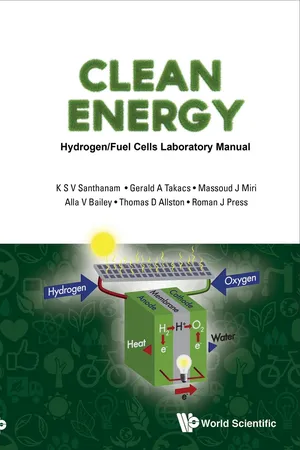
Clean Energy: Hydrogen/fuel Cells Laboratory Manual
Hydrogen/Fuel Cells Laboratory Manual(with DVD-ROM)
- 140 pages
- English
- ePUB (mobile friendly)
- Available on iOS & Android
Clean Energy: Hydrogen/fuel Cells Laboratory Manual
Hydrogen/Fuel Cells Laboratory Manual(with DVD-ROM)
About This Book
This manual is designed for the use of hydrogen as a fuel in the fuel cells. The turn of the century has seen a realization of moving towards clean energy due to a variety of considerations ranging from global warming, anxiety to living in a healthy atmosphere, depletion of fossil fuels, oil slick in Gulf of Mexico resulting in disasters and so forth. Innumerable debates in the literature has led to the identification of hydrogen as the safest and efficient fuel over the other available fuels. This fuel can be used in two ways: a) direct combustion like gasoline and b) fuel cells. The use of it by the first method requires pure oxygen to be used for combustion; it is an expensive method involving oxygen storage and transportation. If oxygen is substituted by air in the combustion, it produces nitrogen oxides that are defying the definition of clean energy. The other method is to use it as a fuel cell for easy emission free transportation. Here chemical energy is converted to electrical energy directly in a fuel cell. To illustrate principles of related fuel cells, methanol and borohydride fuel cells are included in this manual. The nine experiments described here are designed for illustrating the concepts for the beginners and those motivated to go for clean energy.
Contents:
- Hydrogen Safety
- Gaseous Properties of Hydrogen
- Determination of Fuel Value
- Performance Characteristics of Polymer Electrolyte Fuel Cell
- Properties of Proton Exchange Membranes Used in Fuel Cells
- Performance Characteristics of a Dissolved Methanol Fuel Cell
- Borohydride Fuel Cell Performance Characteristics
- Solar Electrolyzer Fueled Polymer Electrolyte Membrane Fuel Cell
- Hydrogen Storage Capacity of Hydrogen-Containing Compounds
Readership: General audience interested in clean energy, global warming solutions, fuel cells, hydrogen gas safety tests; undergraduate students taking general chemistry course or energy as minor; graduate students who wish to learn the basic fuel cells, mechanical and electrical engineering students.
Frequently asked questions
Information
Table of contents
- Cover
- Halftitle
- Title Page
- Copyright
- Preface
- Contents
- Lab 1: Hydrogen Safety
- Lab 2: Gaseous Properties of Hydrogen
- Lab 3: Determination of Fuel Value
- Lab 4: Performance Characteristics of Polymer Electrolyte Fuel Cell
- Lab 5: Properties of Proton Exchange Membranes Used in Fuel Cells
- Lab 6: Performance Characteristics of a Dissolved Methanol Fuel Cell
- Lab 7: Borohydride Fuel Cell Performance Characteristics
- Lab 8: Solar Electrolyzer Fueled Polymer Electrolyte Membrane Fuel Cell
- Lab 9: Hydrogen Storage Capacity of Hydrogen-Containing Compounds